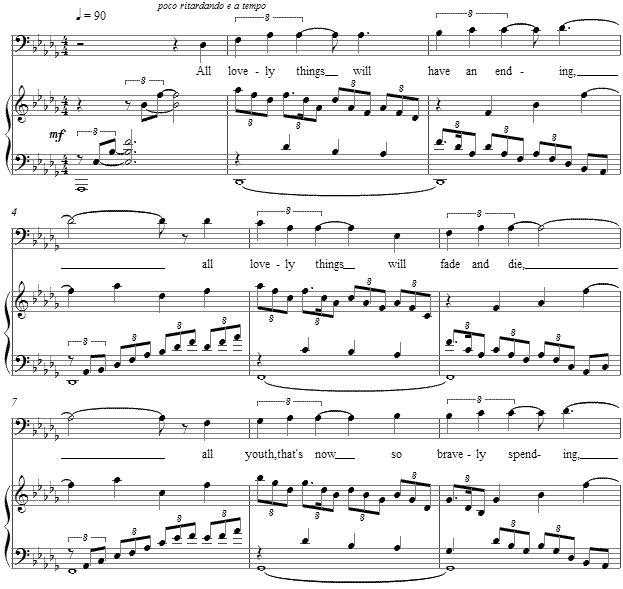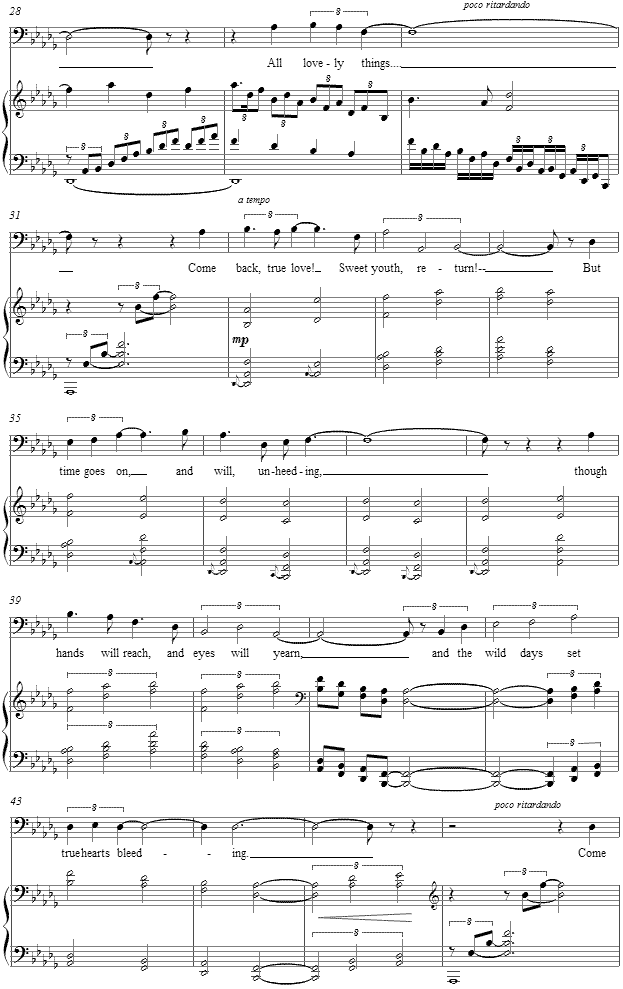Music and Texts of GARY BACHLUND Vocal Music | Piano | Organ | Chamber Music | Orchestral | Articles and Commentary | Poems and Stories | Miscellany | FAQs |
All Lovely Things - (2005)
Conrad Aiken
originally for bass or bass-baritone and piano
All lovely things will have an ending,
All lovely things will fade and die,
And youth, that's now so bravely spending,
Will beg a penny by and by.
Fine ladies soon are all forgotten,
And goldenrod is dust when dead,
The sweetest flesh and flowers are rotten
And cobwebs tent the brightest head.
Come back, true love! Sweet youth, return!--
But time goes on, and will, unheeding,
Though hands will reach, and eyes will yearn,
And the wild days set true hearts bleeding.
Come back, true love! Sweet youth, remain!--
But goldenrod and daisies wither,
And over them blows autumn rain,
They pass, they pass, and know not whither.[ 5 pages, circa 3' 00" ]
Conrad Aiken
American poet Conrad Aiken (1889-1973) was born in Savannah, Georgia, and was also a short story writer, critic and novelist. At Harvard he shared a class with T. S. Eliot, with whom he edited the Advocate and whose poetry was to influence his own. Aiken graduated in 1912, in the same era as Eliot and Cummings. Editor of Emily Dickinson's Selected Poems (1924), Aiken was heavily responsible for establishing her posthumous literary reputation.
From the 1920s Aiken divided his life between England and the United States, playing a significant role in introducing American poets to the British audience. He was a contributing editor to Dial, which led to a friendship with Ezra Pound, and he served as a consultant in poetry at the Library of Congress from 1950 to 1952. He received a Pulitzer Prize, National Book Award, Bollinger Prize in 1956, Gold Medal in Poetry from the American Academy of Arts and Letters in 1958, and National Medal for Literature in 1969.
It seemed a poor choice to set this text, "All lovely things will fade and die," in dark and depressive musical colors, and so I chose to highlight the "lovely things," for to contemplate their ending is still to have the "lovely things" for the moment, however fleeting. Moreover, the images which Aiken has chosen are themselves "lovely," as is the poem in its entirety. Therefore a slight syncopation against the triple and duple rhythms hints at the sentiment.

When the call for youth to return, to "come back," is made, the ongoing triplets yield to a square and simple harmonic accompaniment which clears a path for the text's pleadings. But as with time and the cycle of life, and as with the recurrence of themes in music and art, the beginning theme insists on its restatement, and at best the text must be content with the truth that such a plea will remain unheard. Such is the fragility and transience of life, and therefore such is the beauty of life as well.

The score is available as a free PDF download, though any major commercial performance or recording of the work is prohibited without prior arrangement with the composer. Click on the graphic below for this piano-vocal score.
